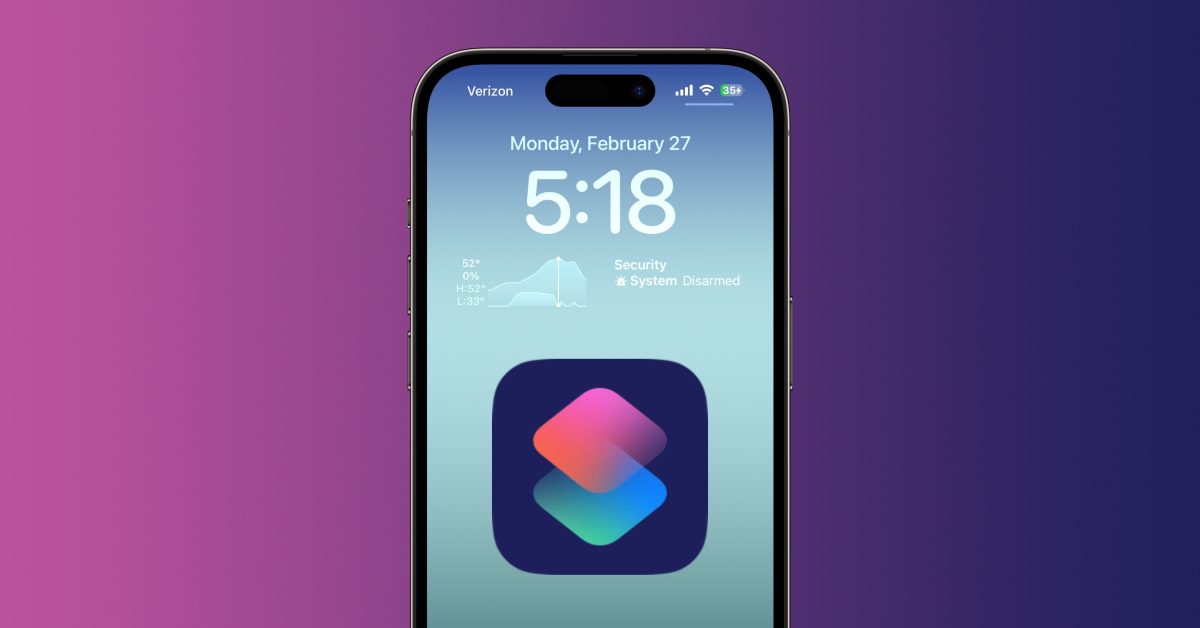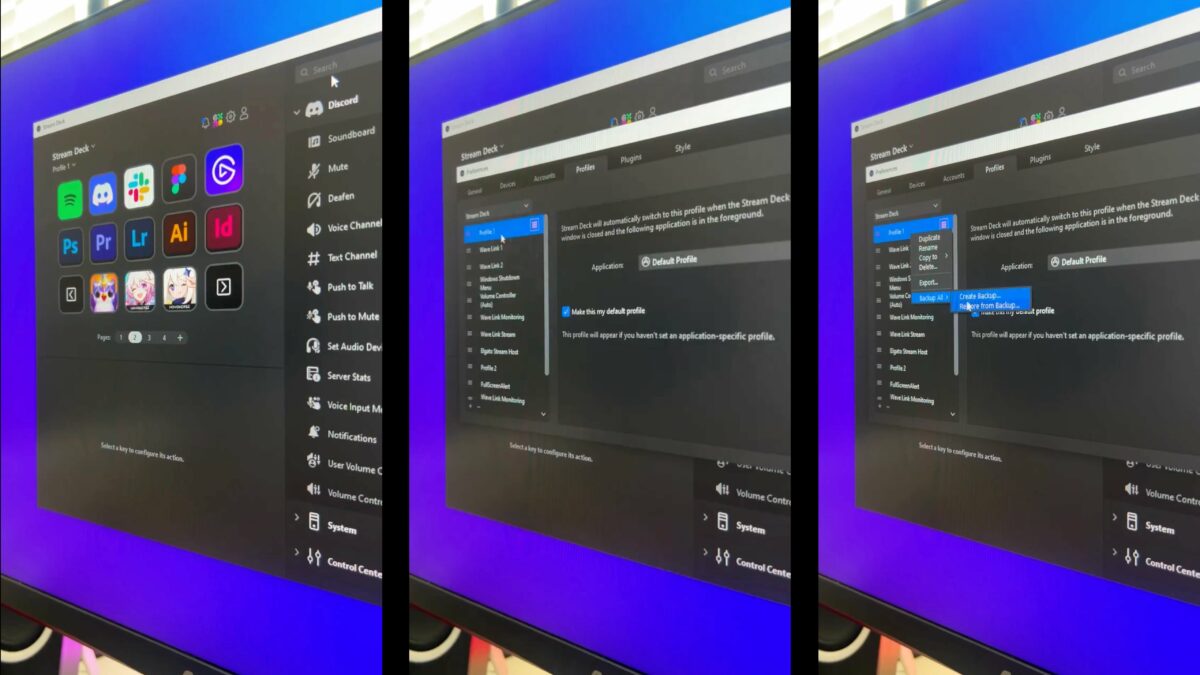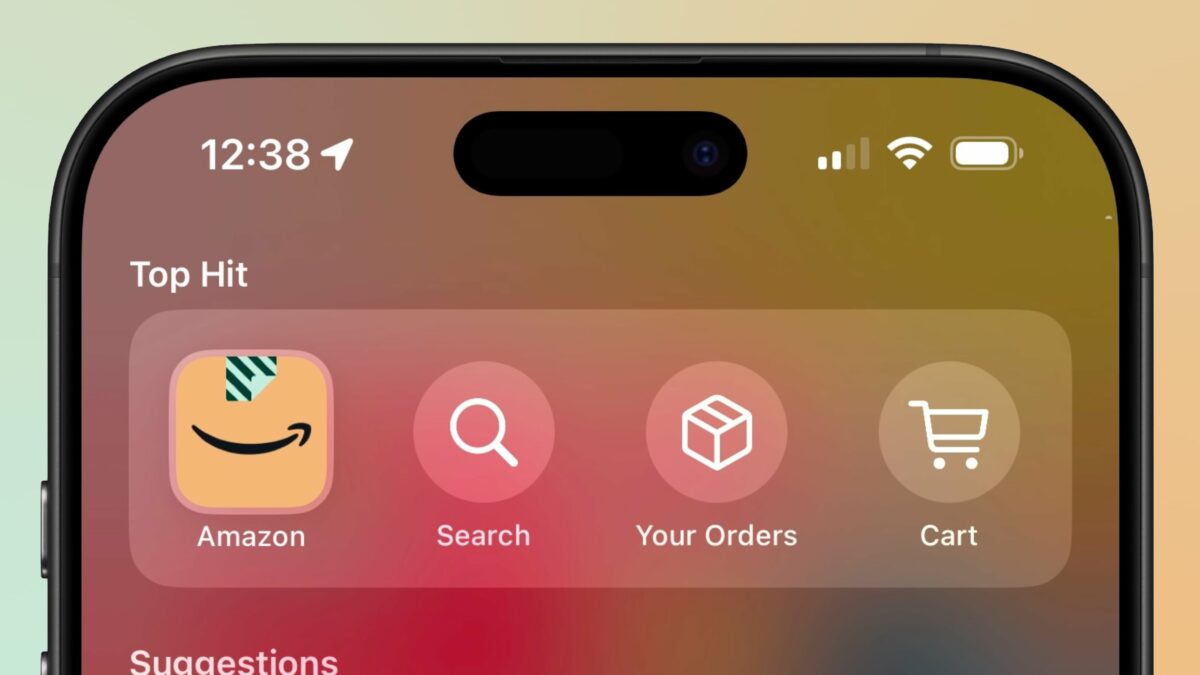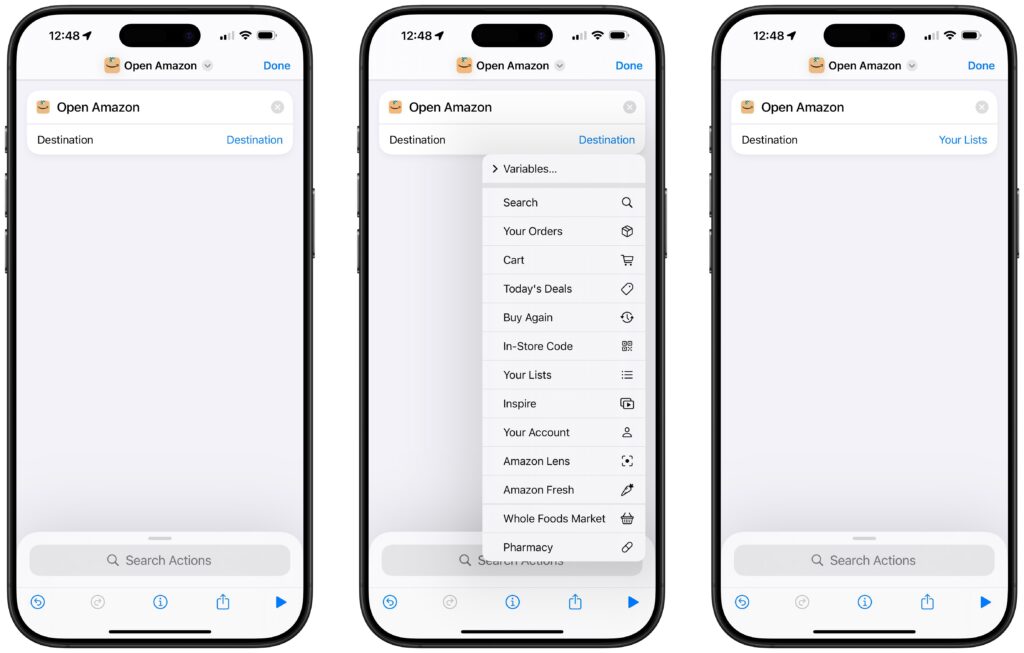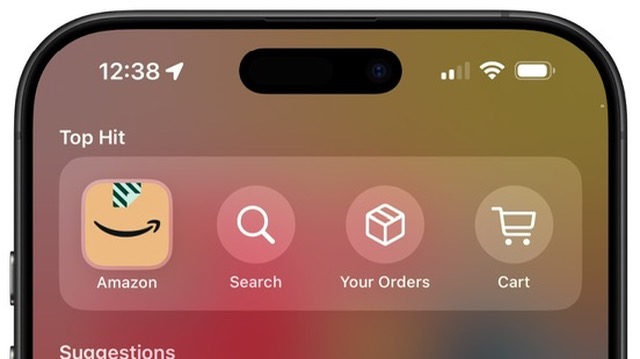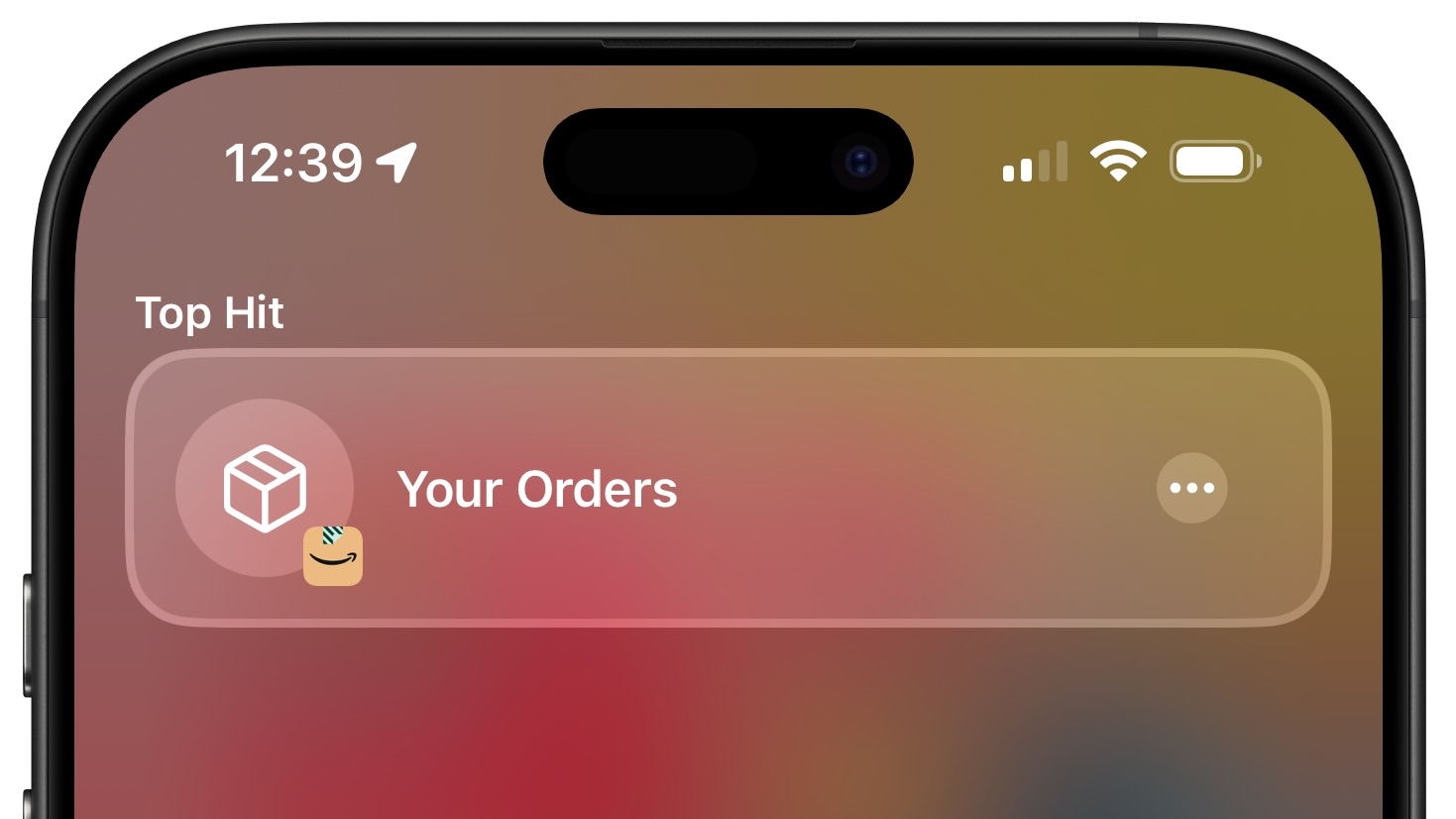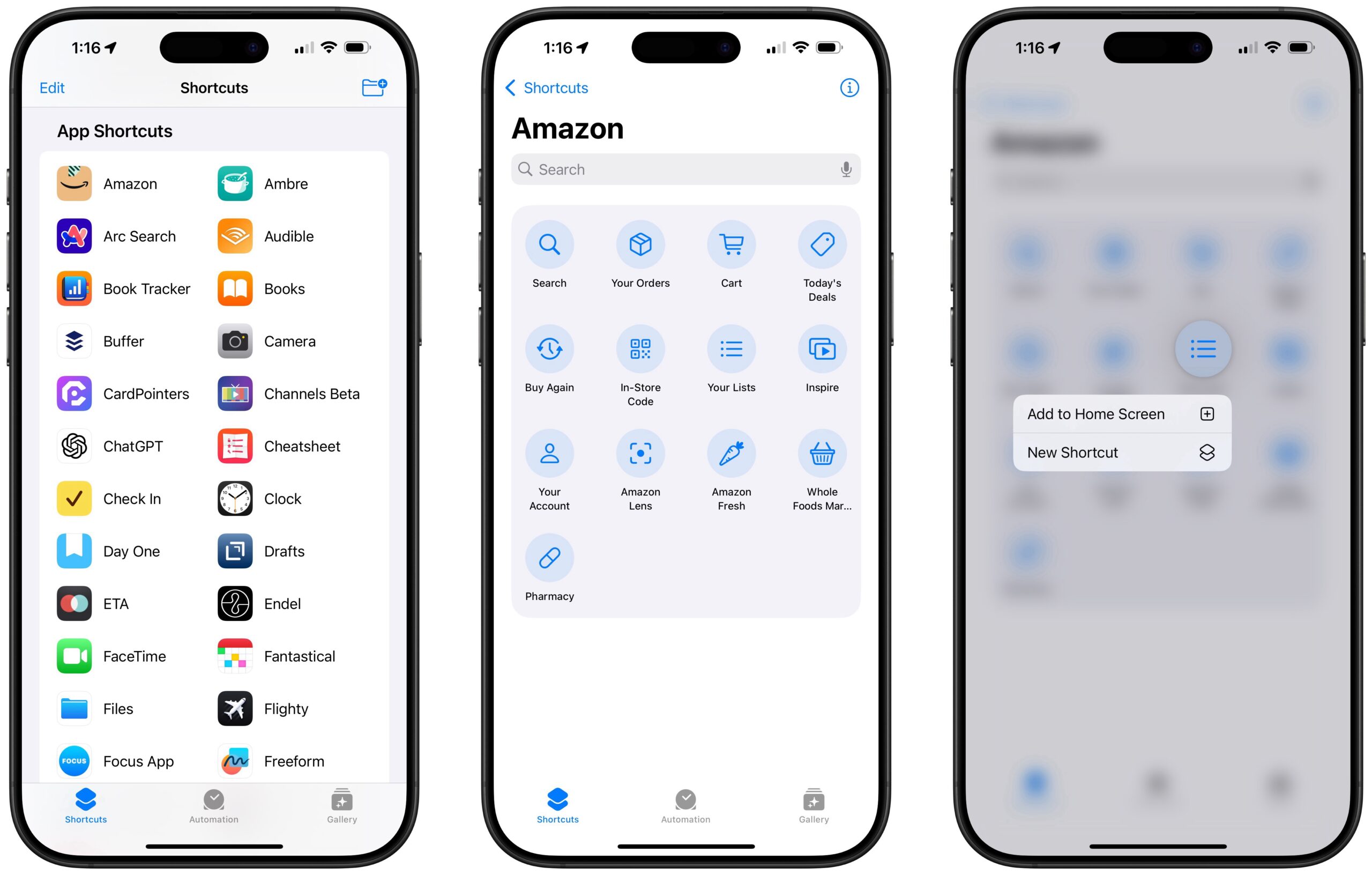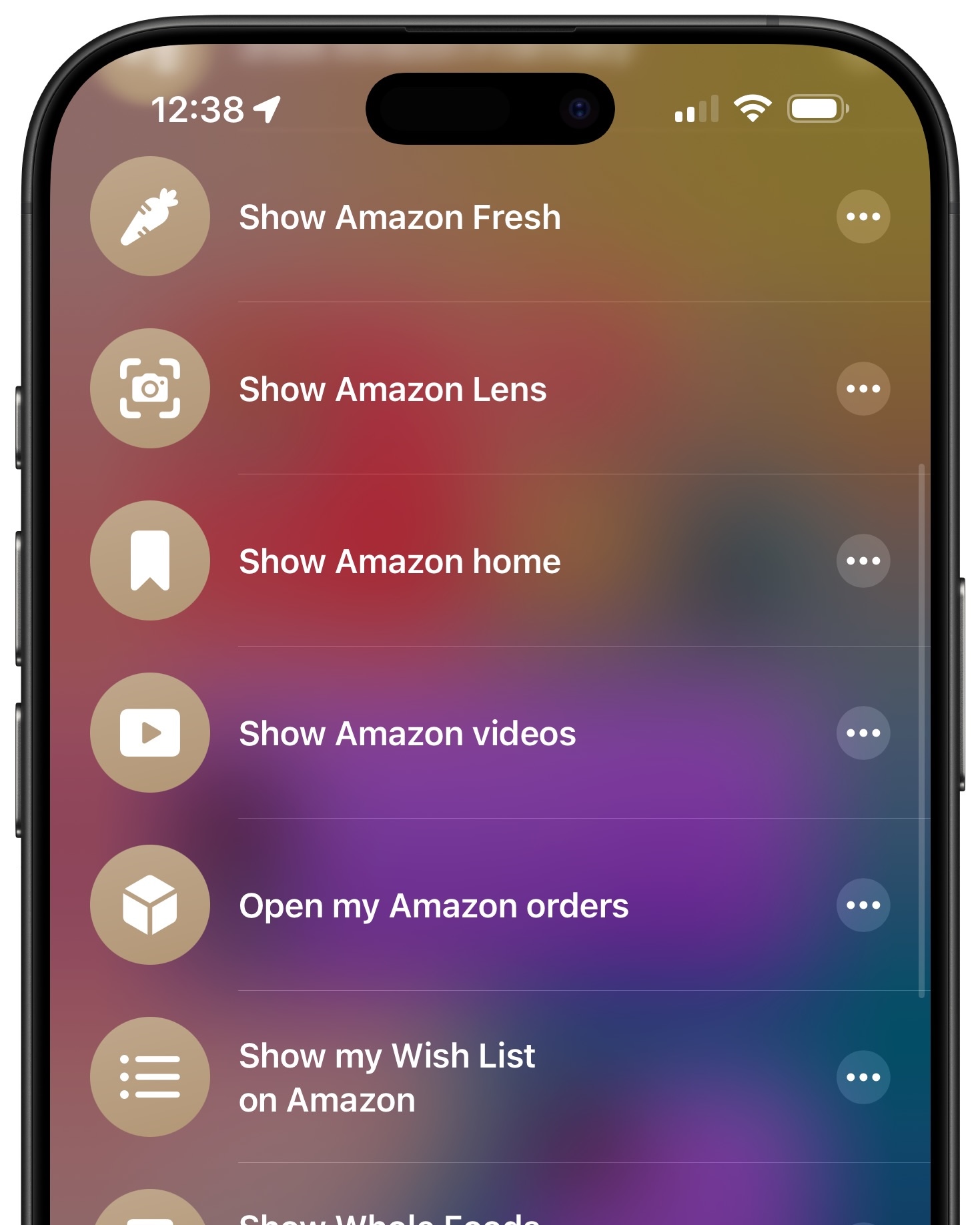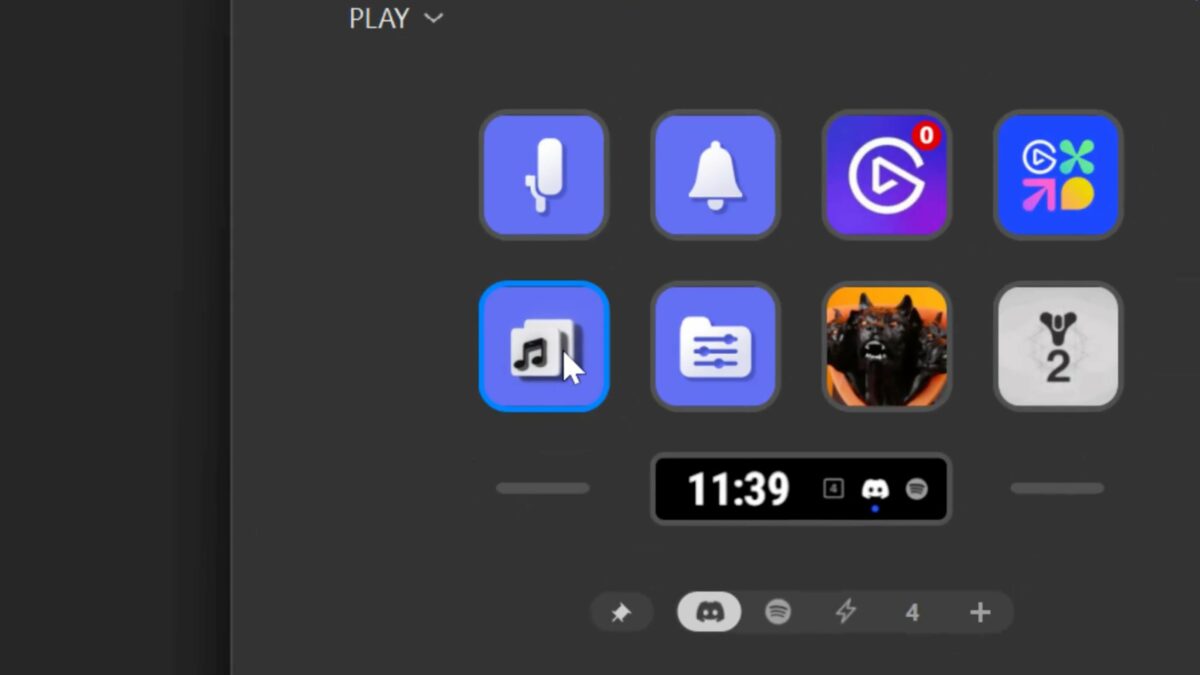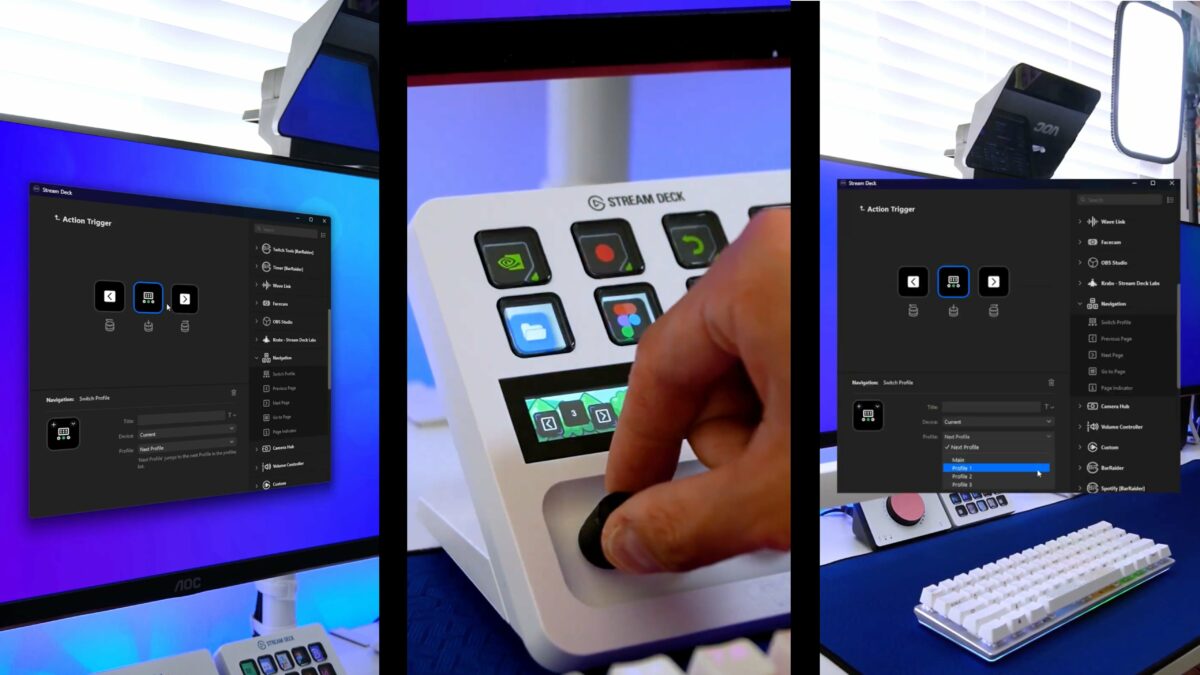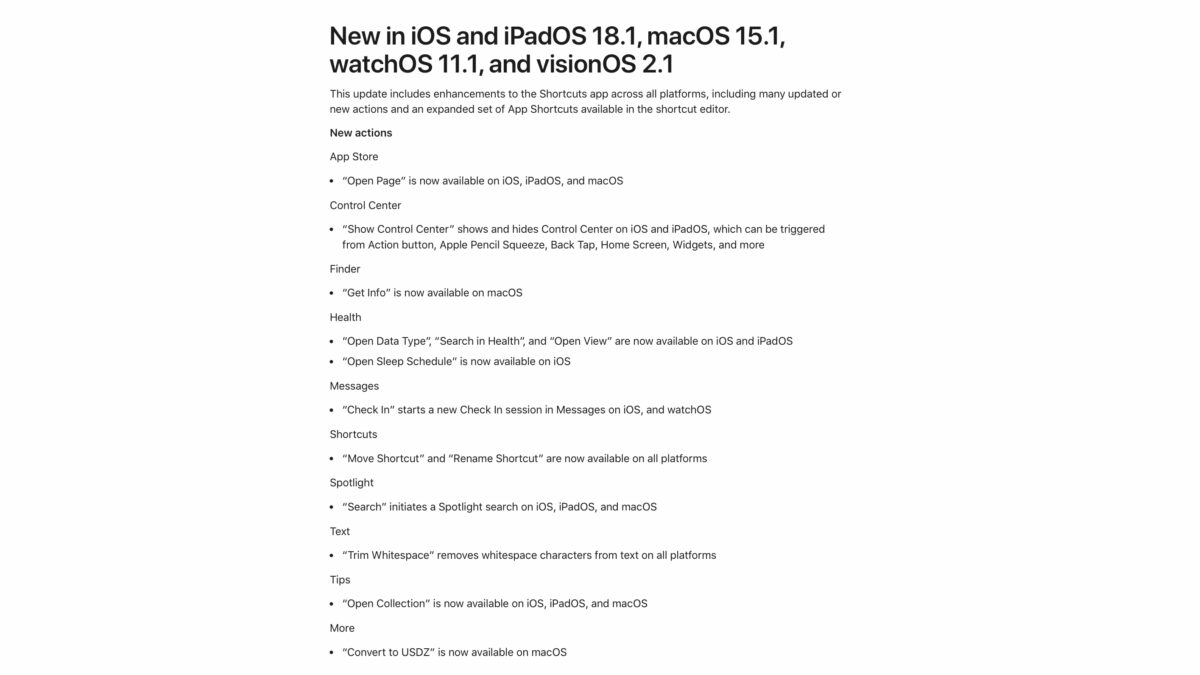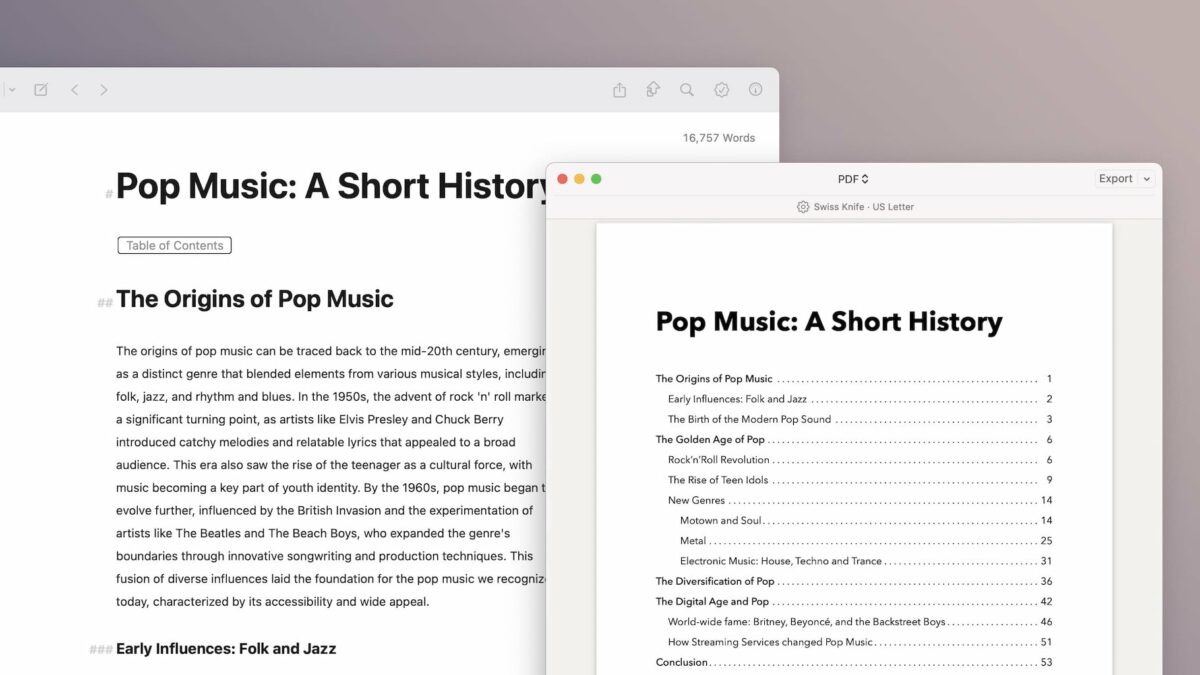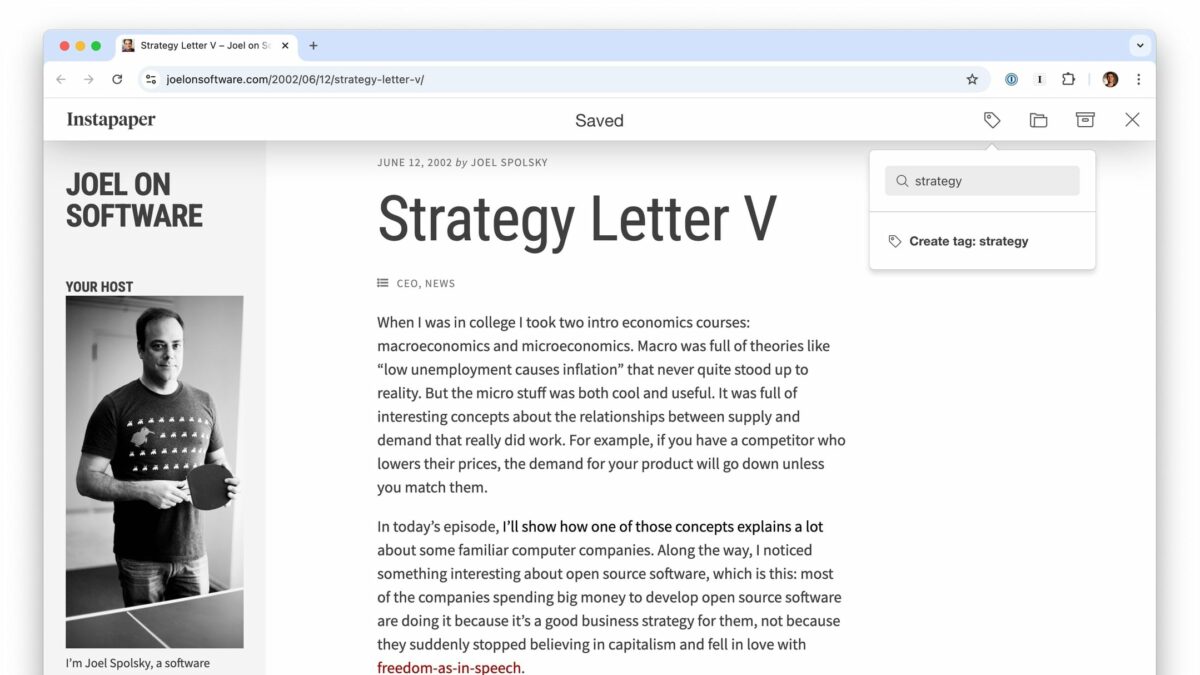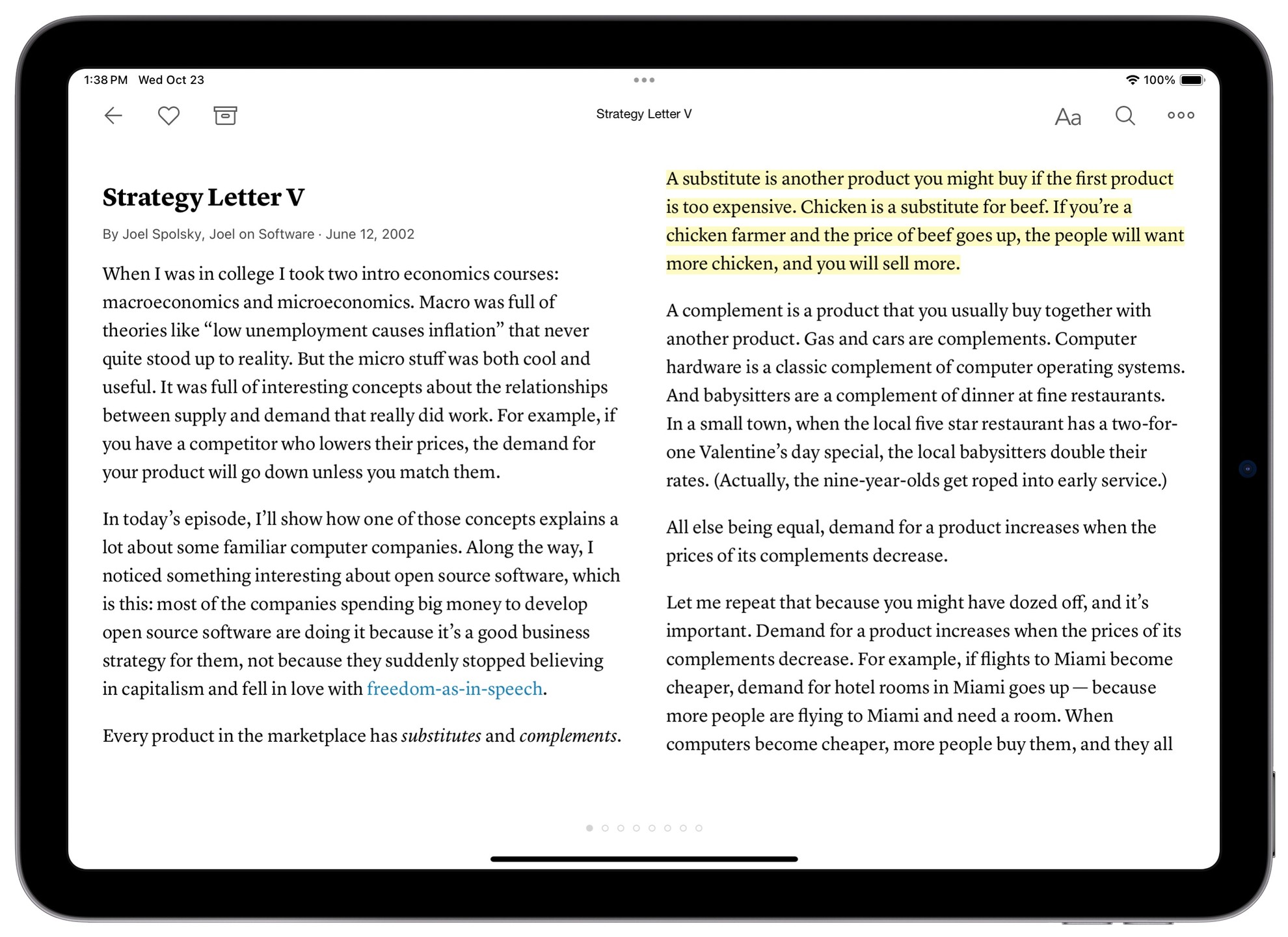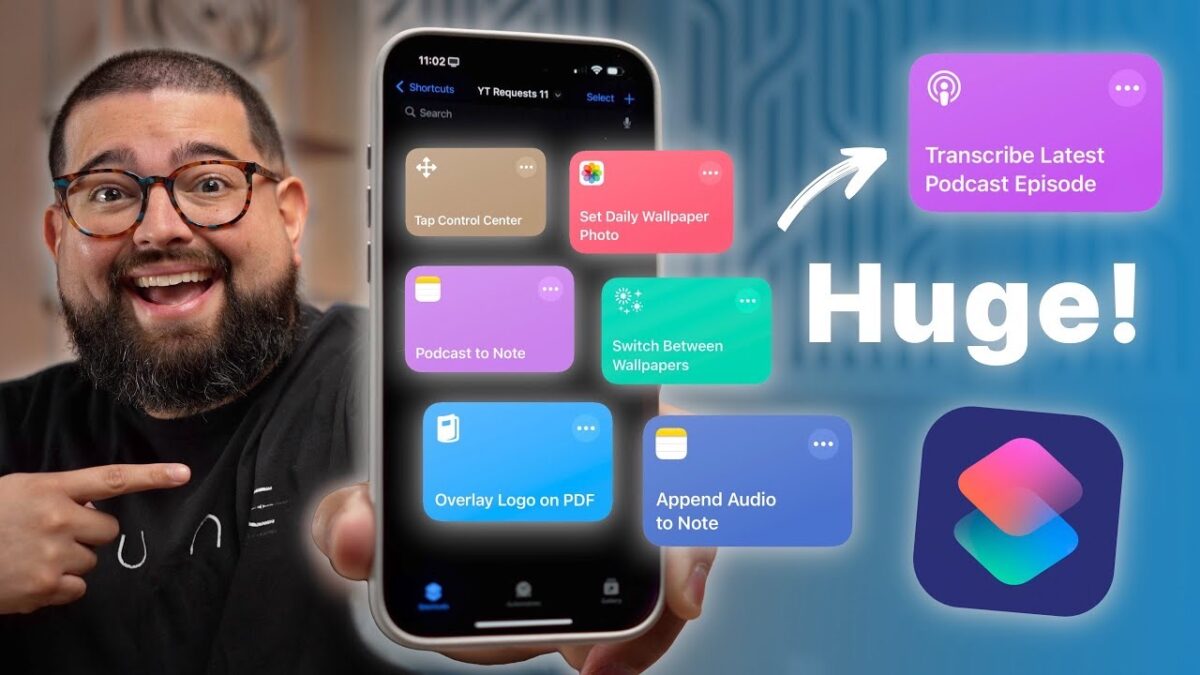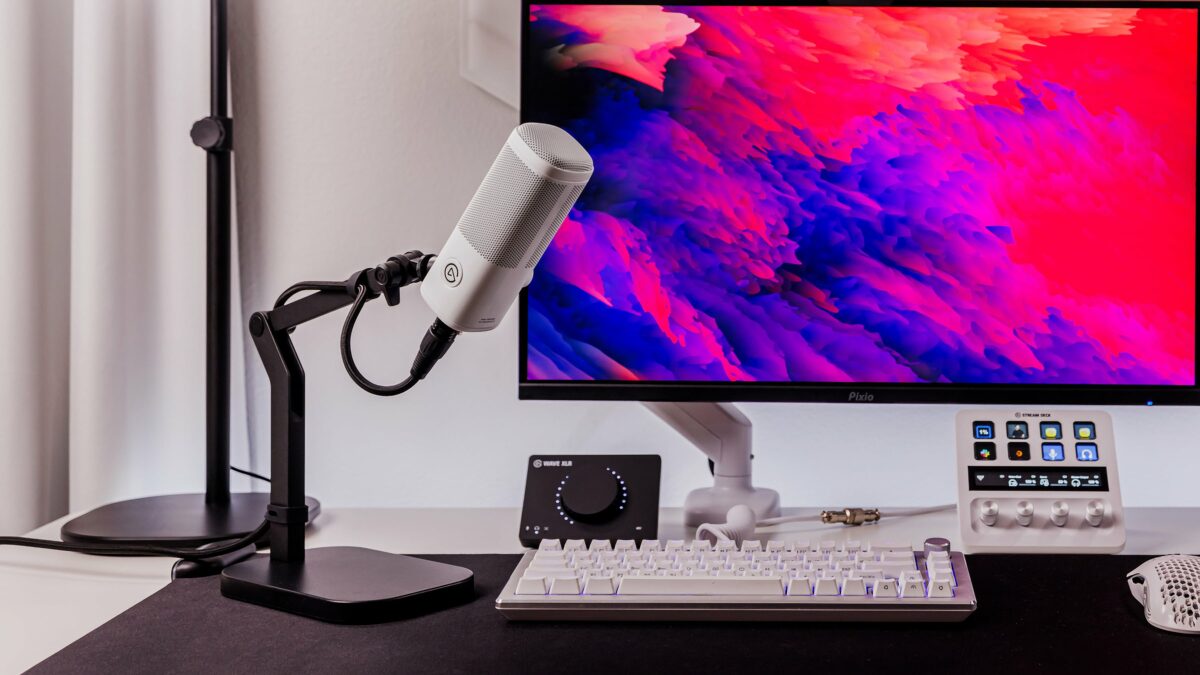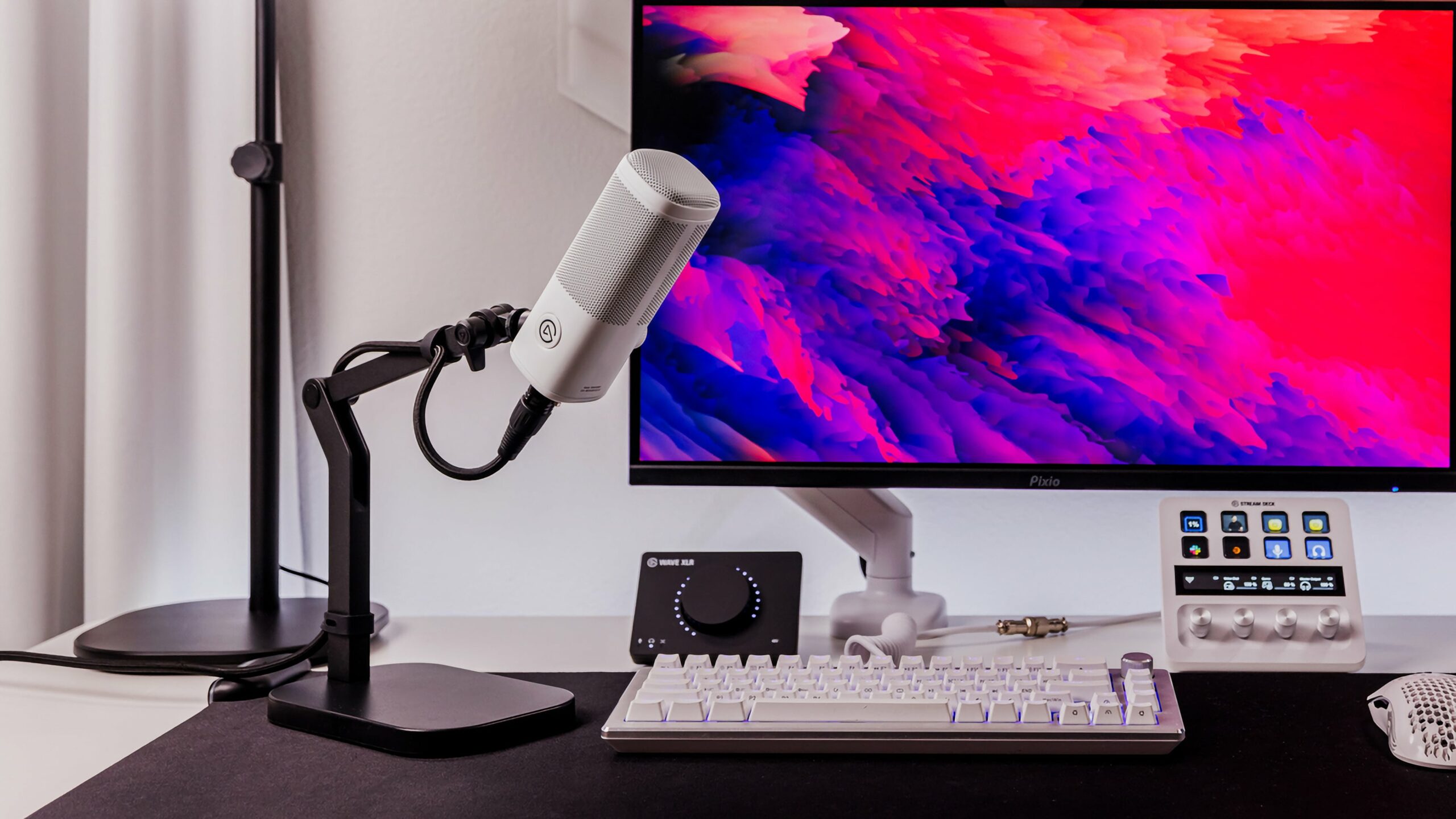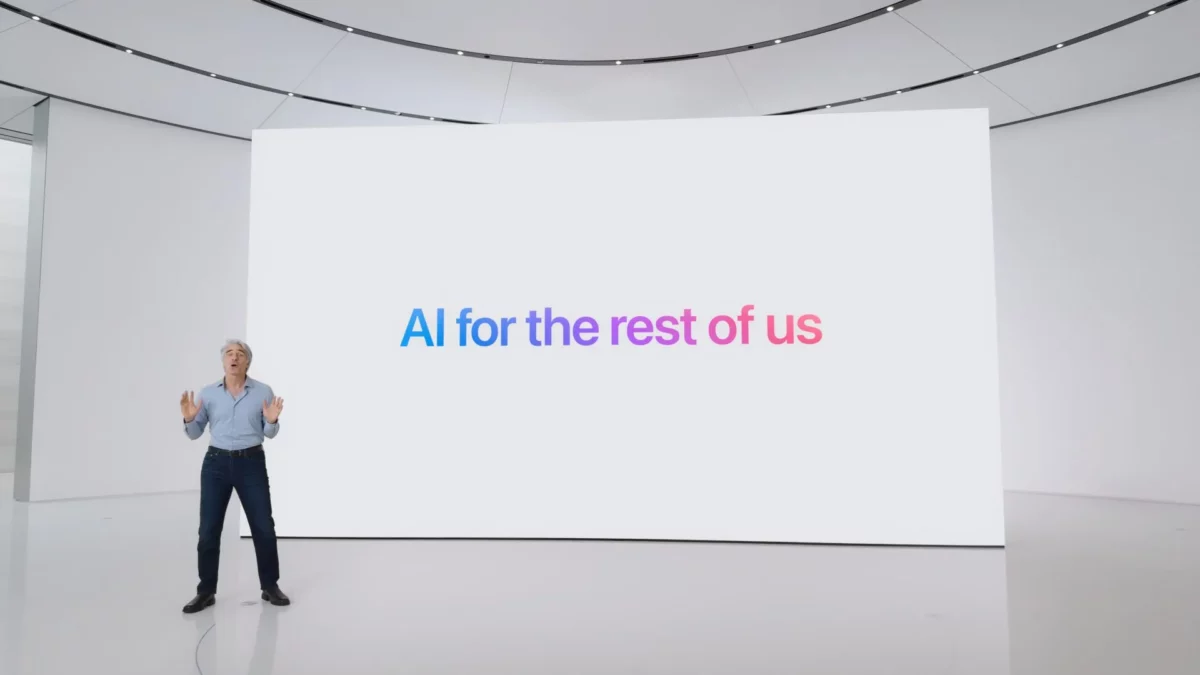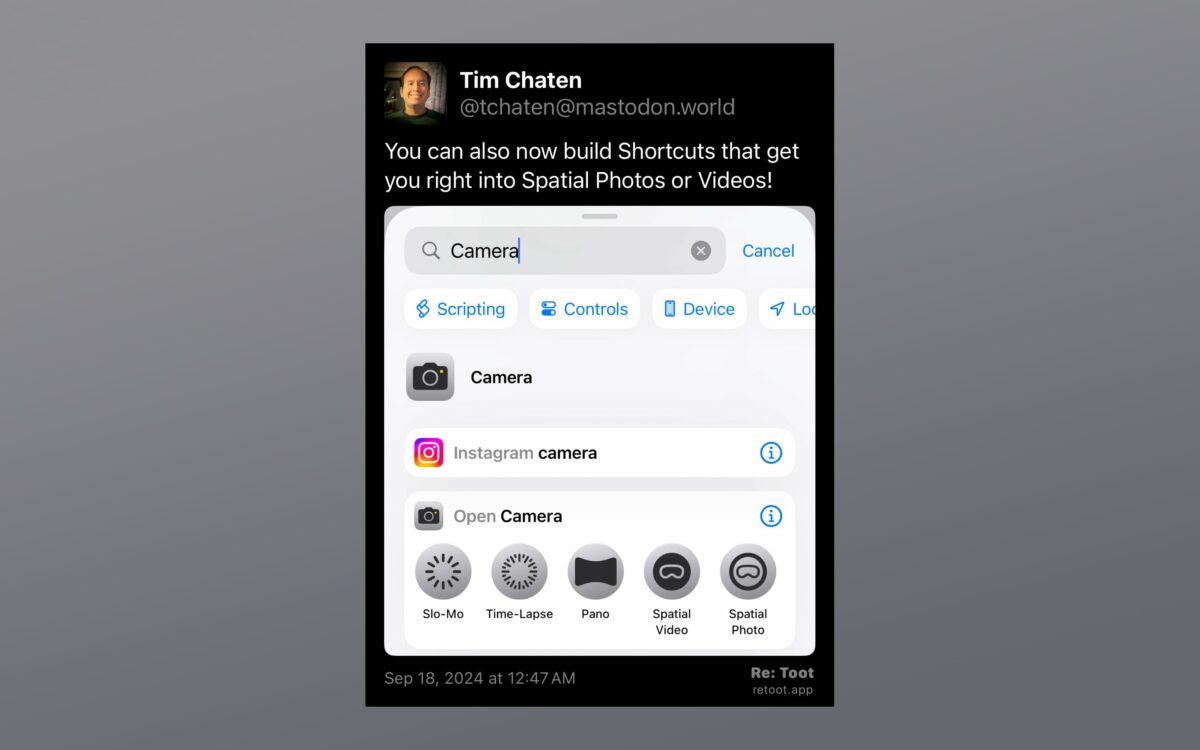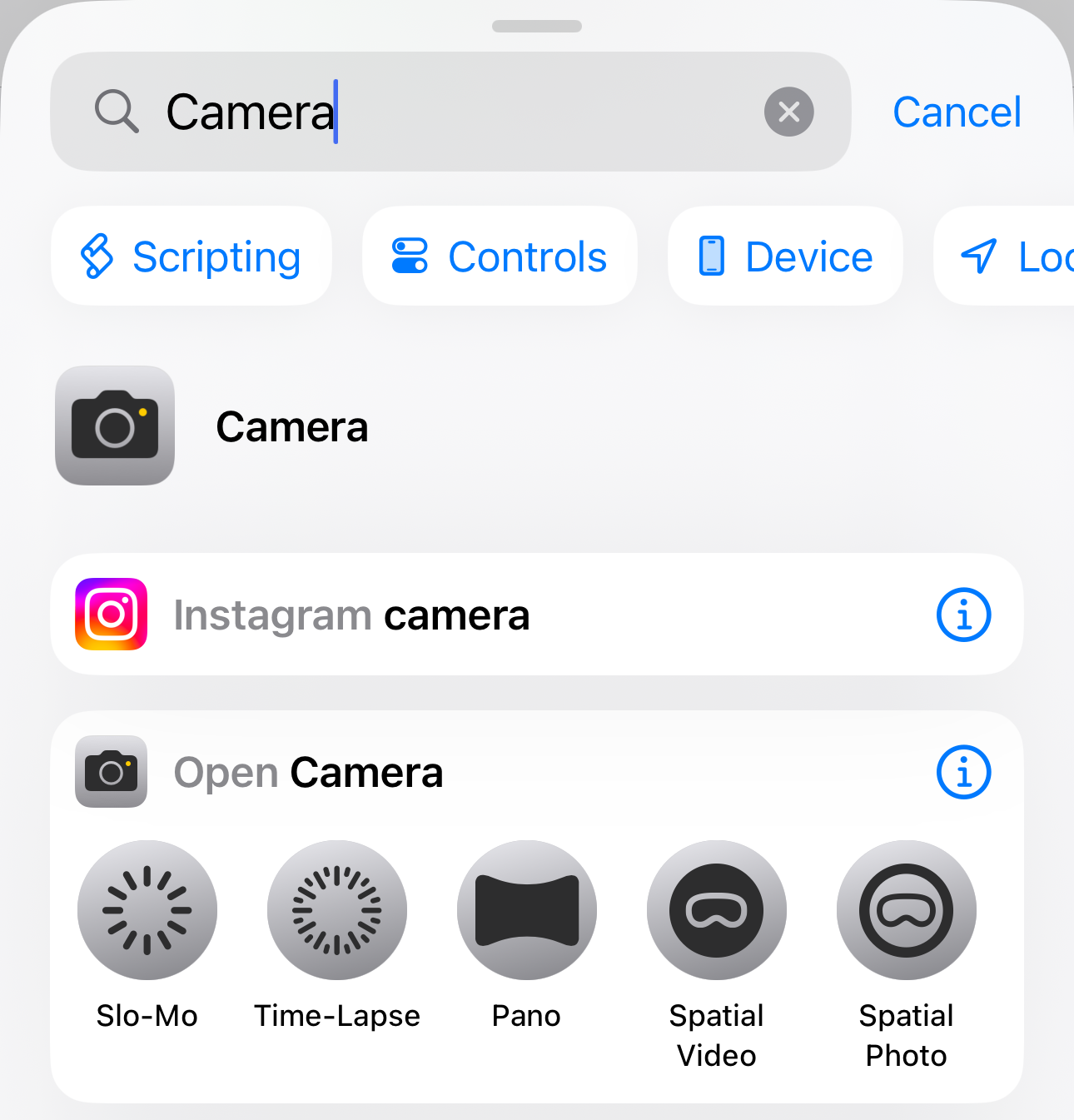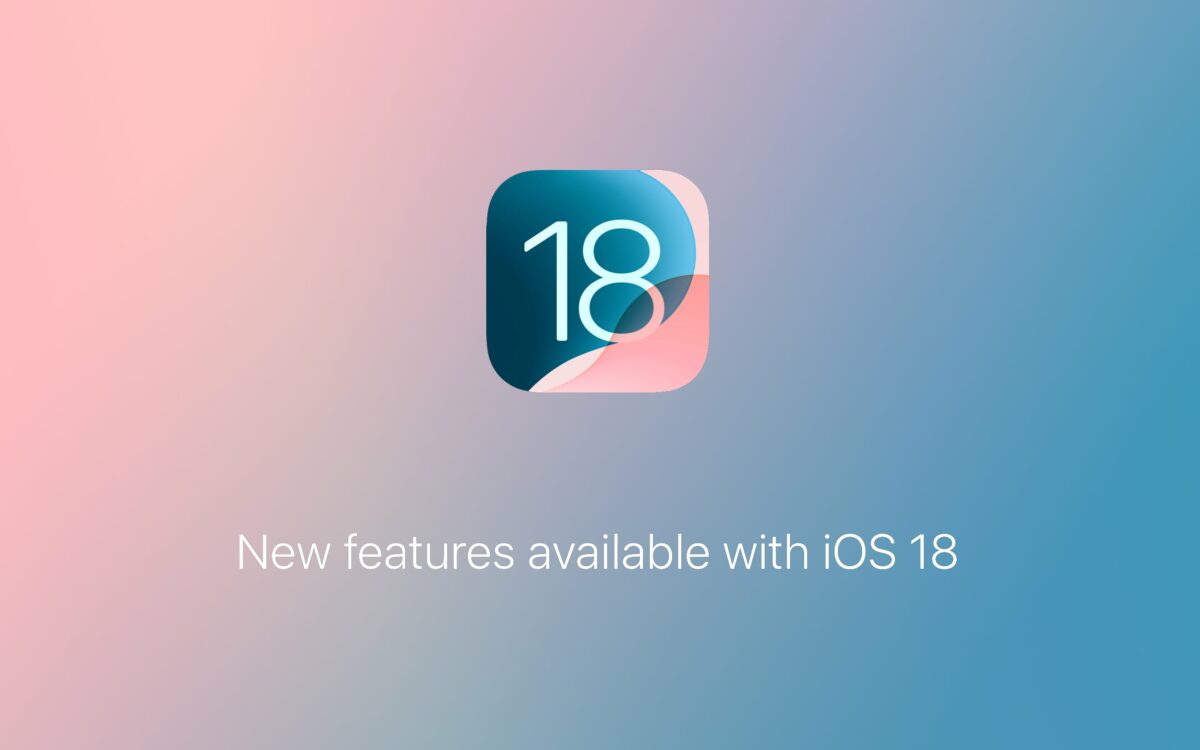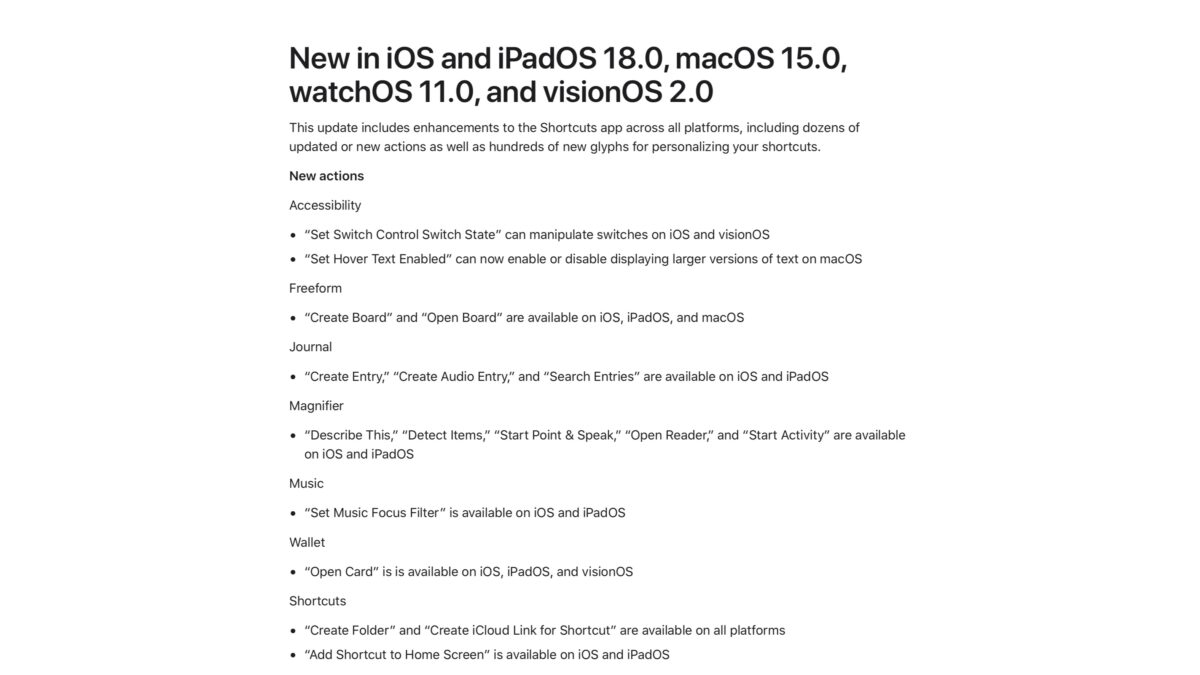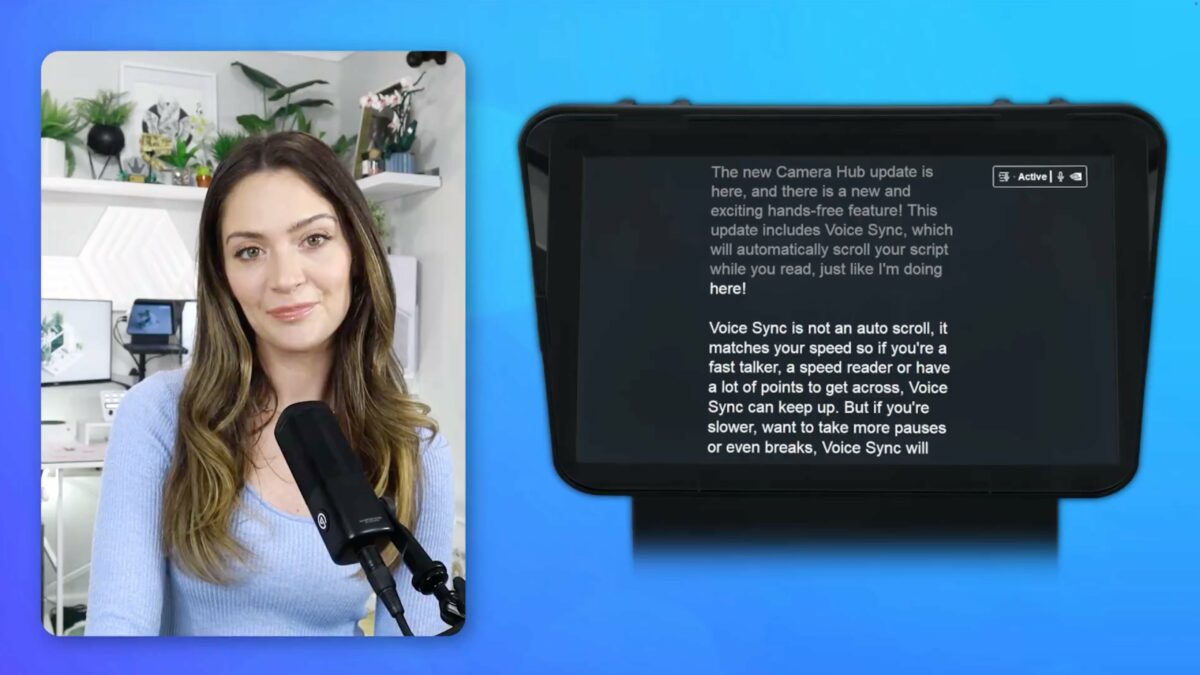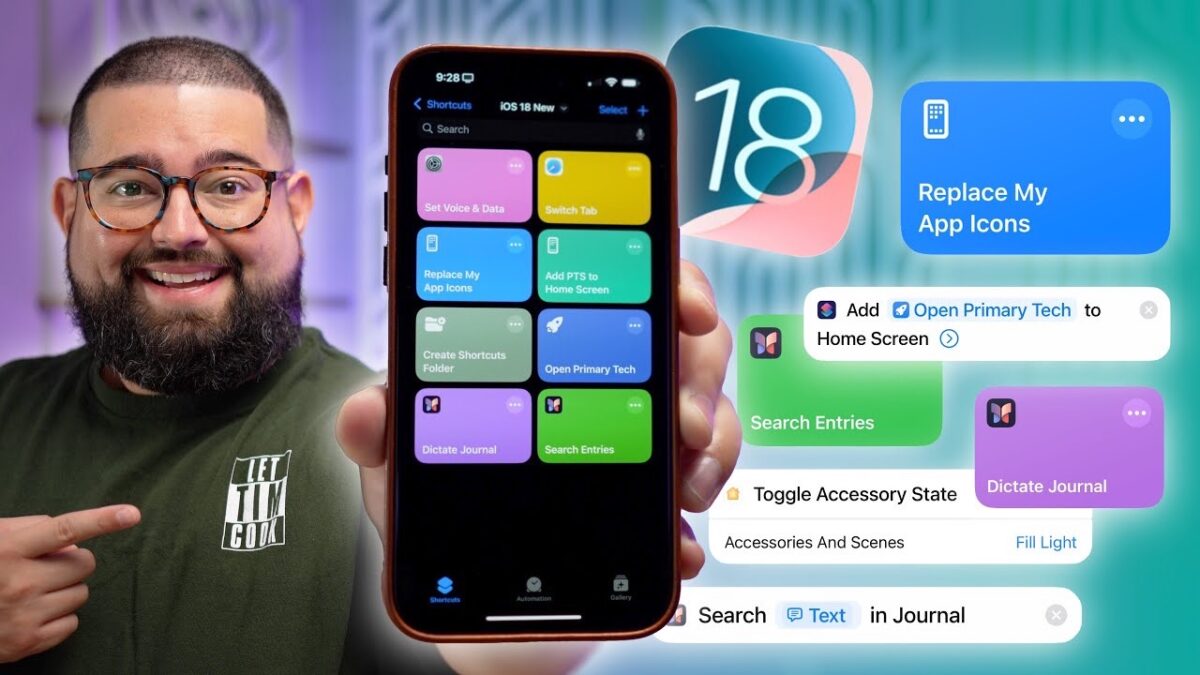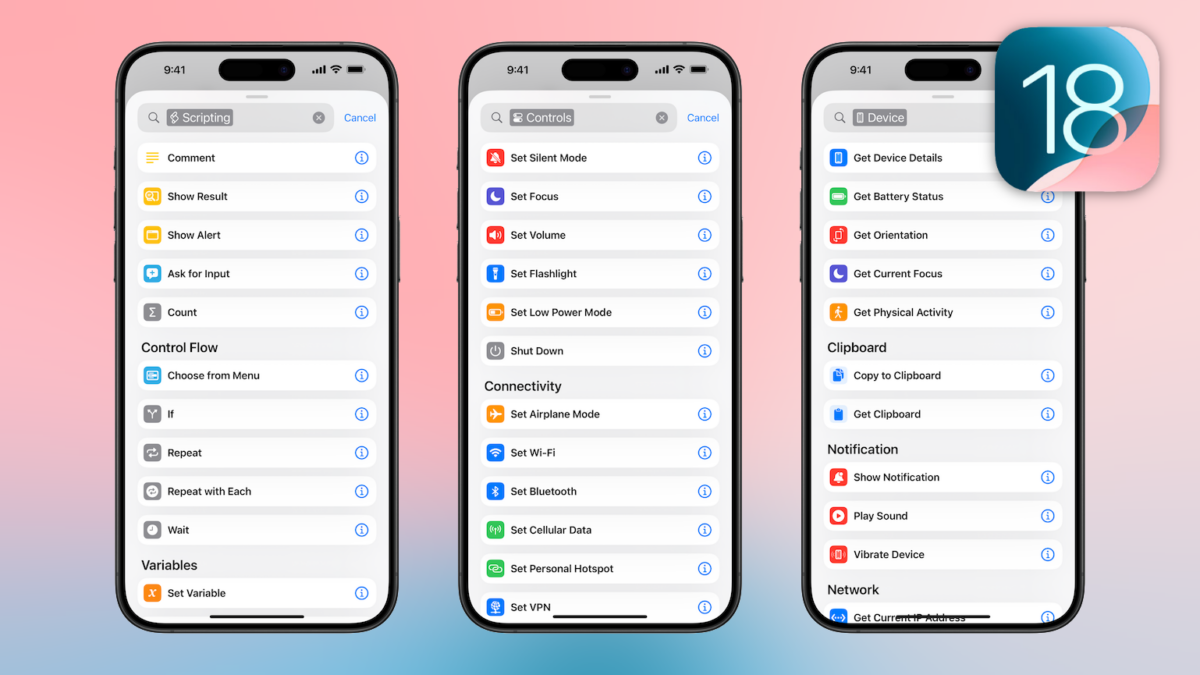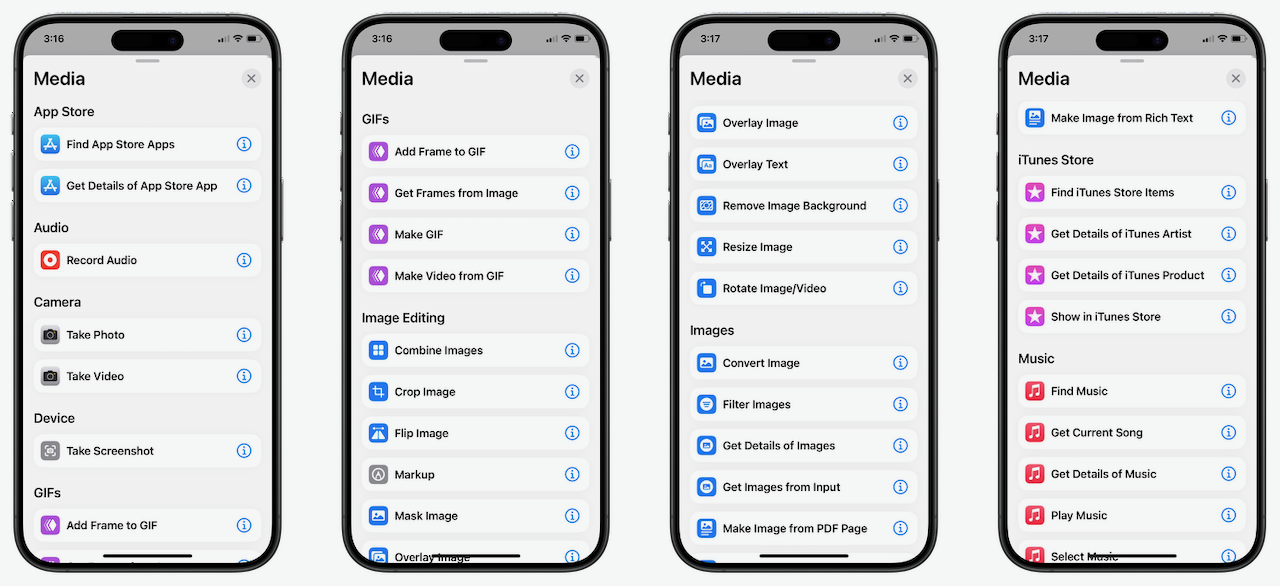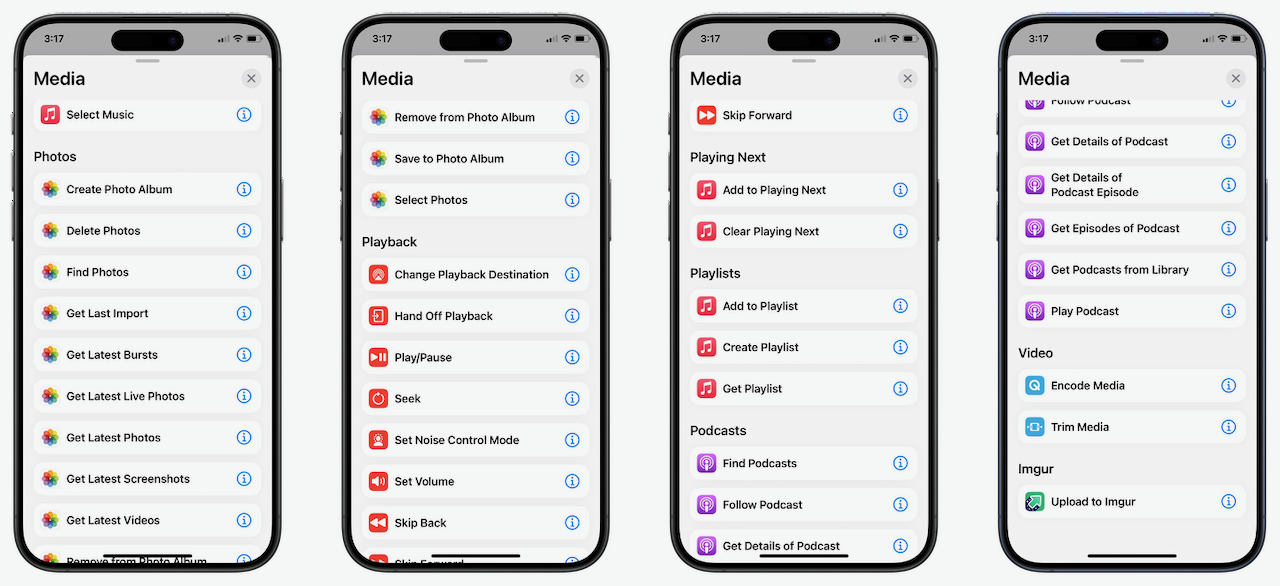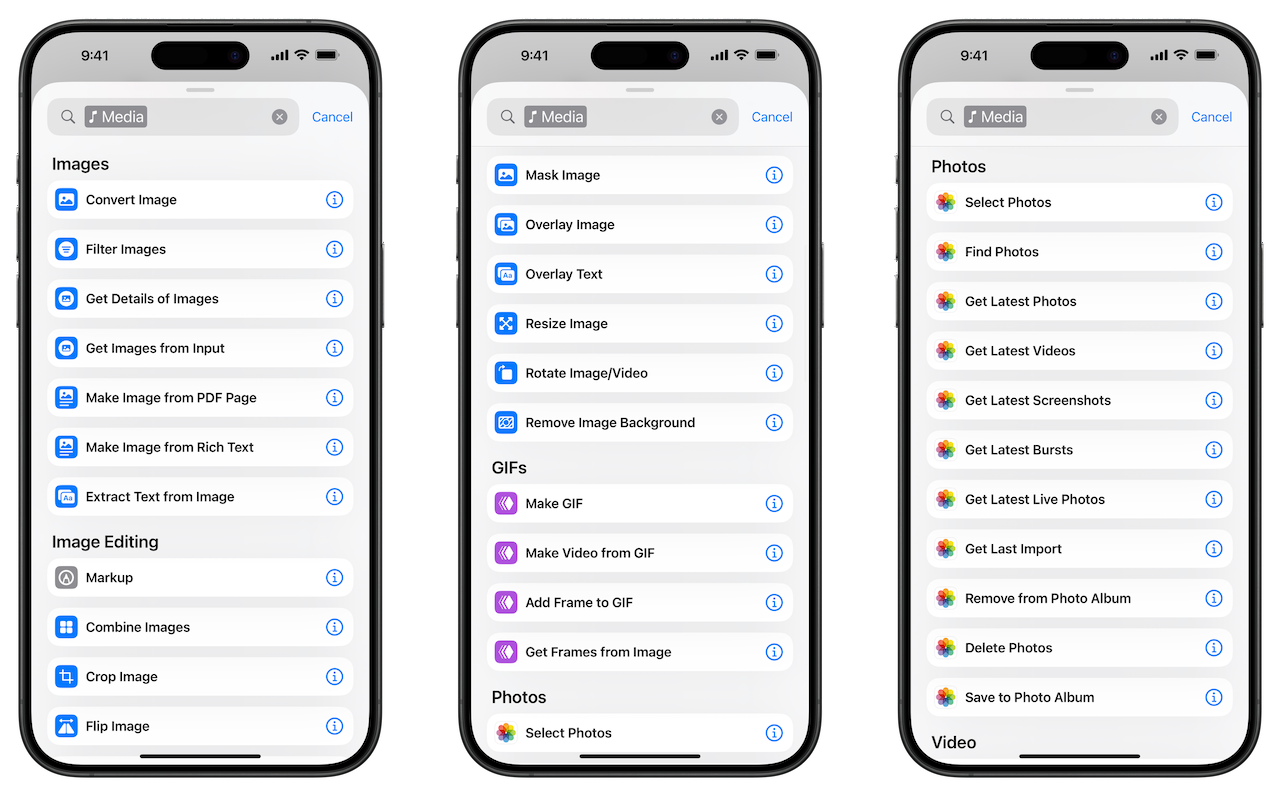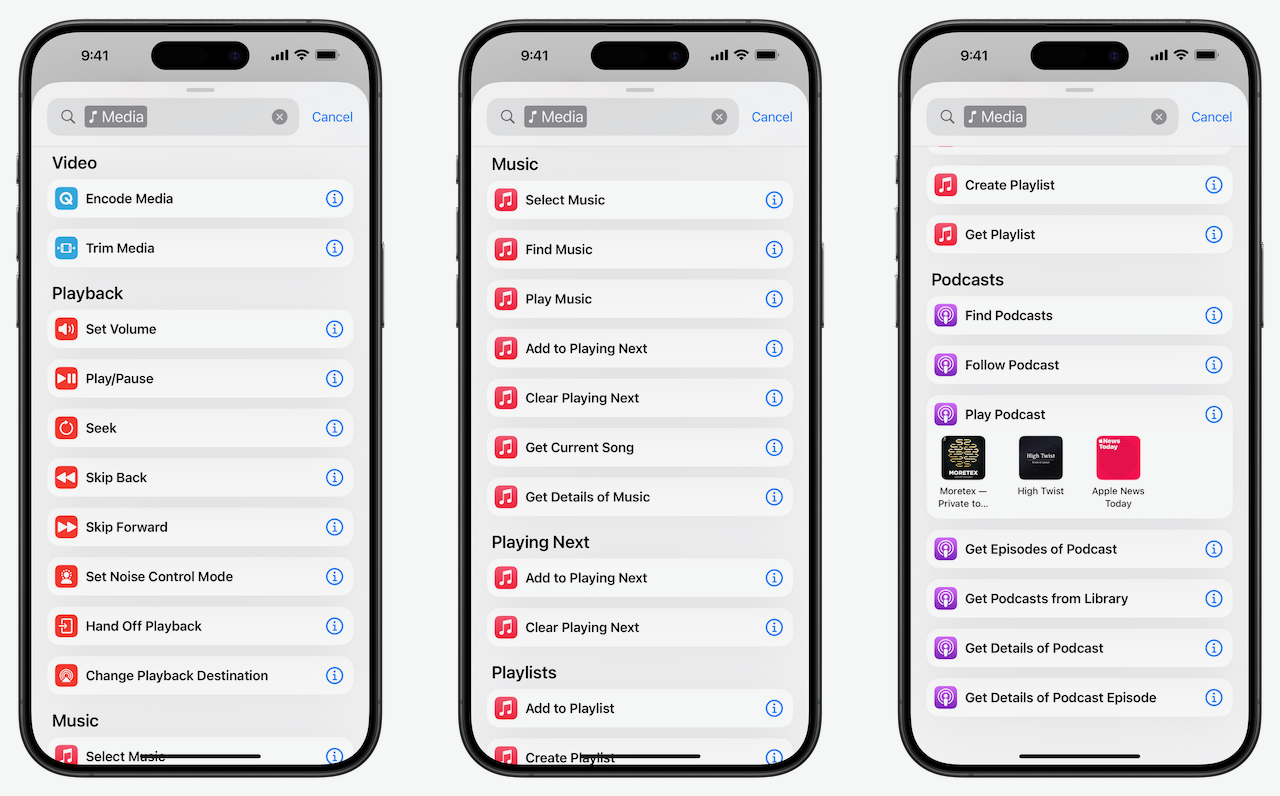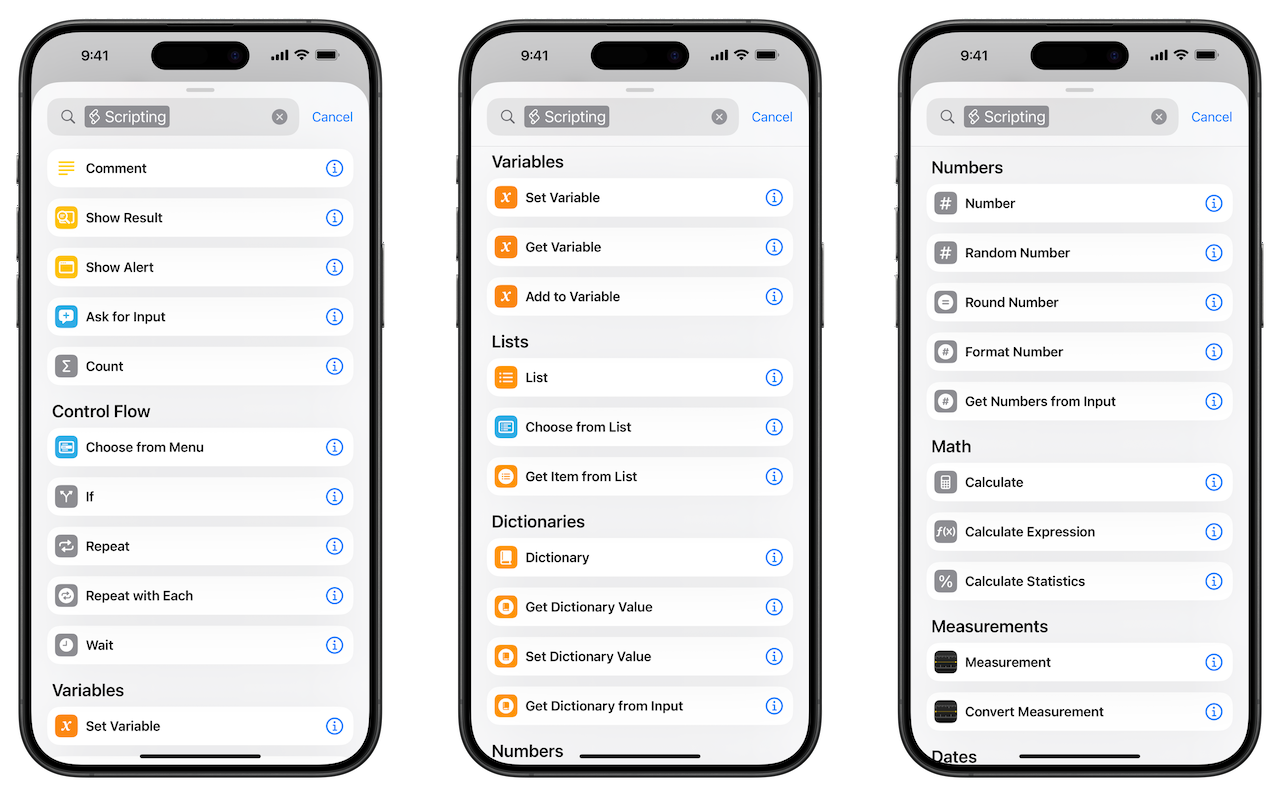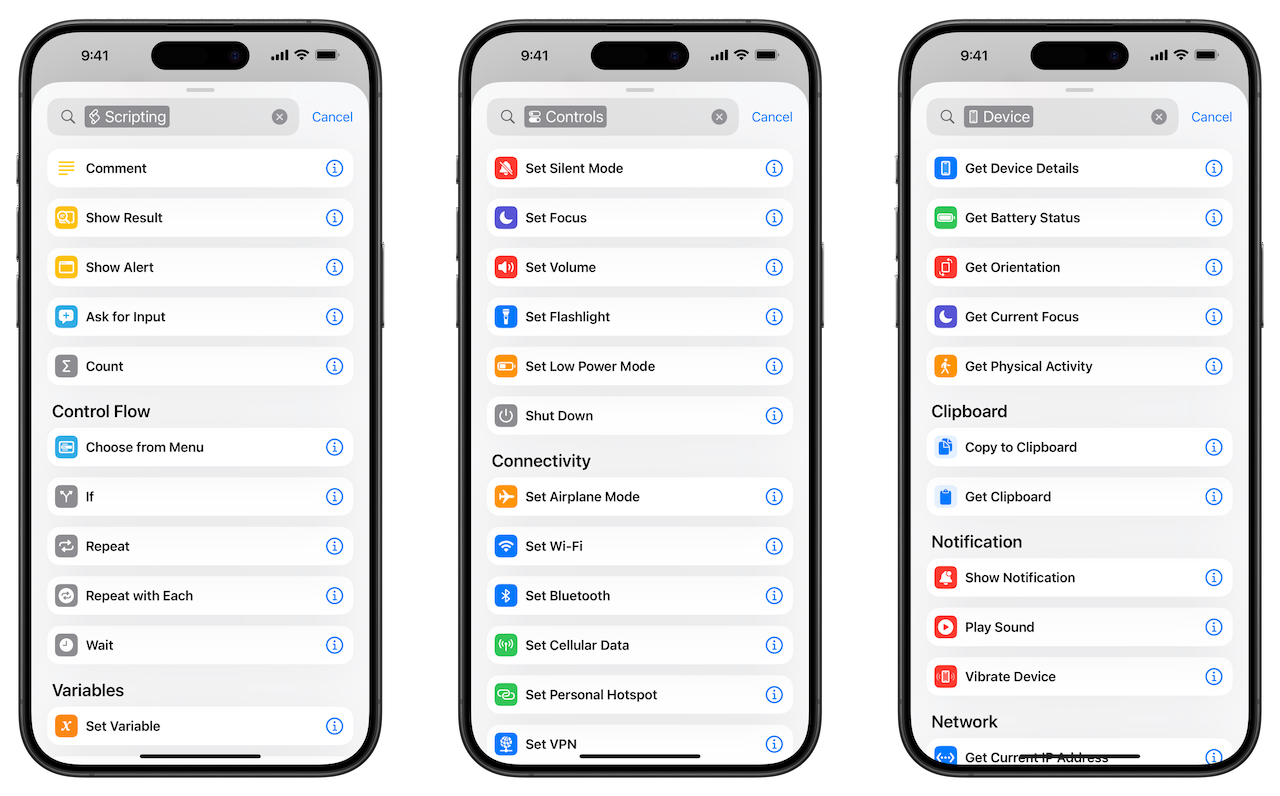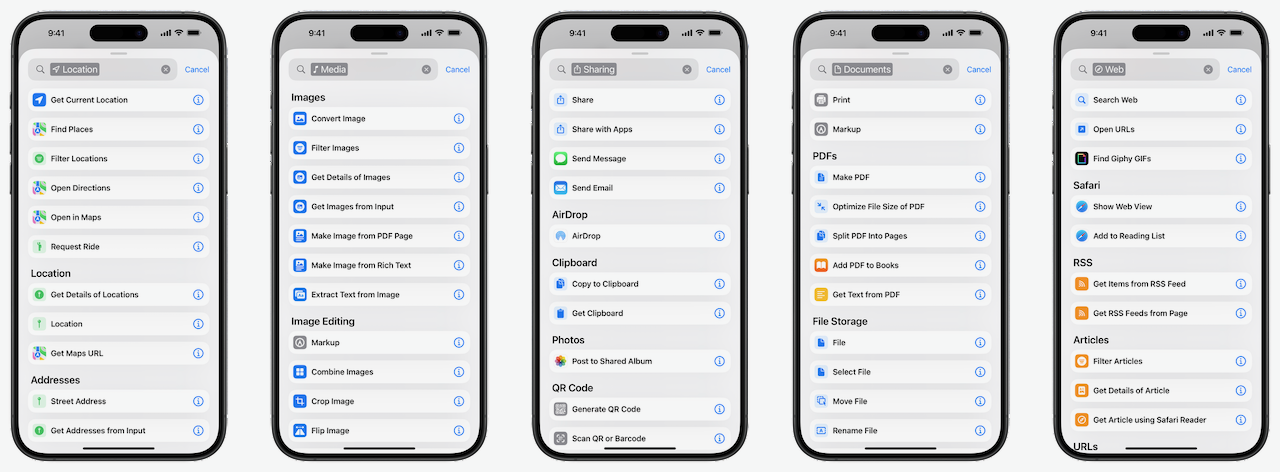In iOS 18.1 developer beta 2, Apple has updated how it organizes actions in the Shortcuts app to create a better experience for users, including a new ordering inside action and categories, as well as two new categories.
This a long overdue change to the Action Editor, which should make it easier for new users to learn how to use Shortcuts – categories are more distinct, important actions are easier to find, and there’s a logical sort order inside groups to help you progressively understand how to use them.
New Order
Throughout all categories and subcategories in the Shortcuts app, Apple has updated the order of actions from alphabetical to a custom order. Instead of actions being ordered by what letter happened to appear at the beginning of what verb happened to be chosen for that action, now the actions inside Shortcuts have a logical order that emphasizes important functions first and group similar functions near each other.
A great example of this new group ordering is in the Media category, which consists of Music, Podcasts, and Photos actions – previously there was were multiple small categories at the beginning (shown above), then photos, then music, then back to photos, then more music in the form of Playlists, and finally podcasts.
Now, all the entire category has been streamlined, music and podcast actions are near each other, and the photos actions are grouped logically as well.
Another great example of the new logical ordering of actions inside categories is the Scripting category, where the most commonly-used actions like Show Result and Ask for Input have been entirely moved up to the top, rather than buried in their respective “No-Ops” and “Notification” categories that deemphasized their critical use while Scripting.
Now, when looking through the Scripting group, it should be easier to find the actions you’re most likely to use near the top, and the more esoteric tools are lower down where advanced users can find them – or just Search for them.
New Groups
Going further, the Scripting category is also now dedicated more directly towards true scripting functions, and in the process Apple has moved a subset of actions out and into new groups for Controls and Device functions.
Over time, as Apple added more and more functionality to the Scripting category, it became bloated with lots of system functions that don’t necessarily relate to the act of scripting, per se.
Now, with the introduction of Controls as function in Control Center, Apple has broken out all Controls-related actions into a new Controls group. Similarly, all the actions that related to the specific Device details have been moved into the new Device category.
These new groups are a great addition, emphasizing the functionality found in Controls and Device categories that might’ve otherwise been lost on users who don’t do much Scripting, while also making the Scripting category more clear on its own.
I hope Apple continues to expand these groups and adds more categories. Apple could open these categories to third-party developers, letting developers add actions to these categories as well as creating more top-level groupings – this would further help users find what actions are available to utilize without going through app-by-app to check.
Welcome Improvements
These updated action grouping, ordering, and new categories are a very welcome addition to the Action Editor experience in Shortcuts – this automation platform has so much potential and little user experience tweaks like this can go a long way towards introducing newer users to such a complicated experience.
And even as a seasoned expert, I’ve wanted these for a long time – hence why I directly asked for these changes via Apple’s Feedback tool, which I’m extremely happy to see implemented.
Check out the developer betas to get early access to these changes, or you can look forward to these updates when iOS 18.1 releases this fall.
Here’s the full breakdown of the new categorization (note that some actions are not contained in a subcategory):
Actions
Scripting
- Comment
- Show Result
- Show Alert
- Ask for Input
- Count
Control Flow
- Choose from Menu
- If
- Repeat
- Repeat with Each
- Wait
Variables
- Set Variable
- Get Variable
- Add to Variable
Lists
- List
- Choose from List
- Get Item from List
Dictionaries
- Dictionary
- Get Dictionary Value
- Set Dictionary Value
- Get Dictionary from Input
Numbers
- Number
- Random Number
- Round Number
- Format Number
- Get Numbers from Input
Math
- Calculate
- Calculate Expression
- Calculate Statistics
Measurement
- Measurement
- Convert Measurement
Dates
- Date
- Format Date
- Adjust Date
- Get Time Between Dates
- Get Dates from Input
- Convert Time Zone
Text
- Text
- Get Text from Input
- Show Definition
- Get Name of Emoji
Text Editing
- Change
- Combine Text
- Split Text
- Replace Text
- Match Text
- Get Group from Matched Text
- Correct Spelling
Audio
- Dictate Text
- Transcribe Audio
- Speak Text
- Make Spoken Audio from Text
Translation
- Detect Language
- Translate Text
Items
- Get Name
- Get Type
- Set Name
- Quick Look
- View Content Graph
Shortcuts
- Get My Shortcuts
- Run Shortcut
Other
- Get What’s On Screen
- Base64 Encode
- Generate Hash
- URL Encode
- Format File Size
- Stop and Output
- Stop This Shortcut
- Wait to Return
- Run Script over SSH
- Open X-Callback URL
- Nothing
Controls
- Set Silent Mode
- Set Focus
- Set Volume
- Set Flashlight
- Set Low Power Mode
- Shut Down
Connectivity
- Set Airplane Mode
- Set Wi-Fi
- Set Bluetooth
- Set Cellular Data
- Set Personal Hotspot
- Set VPN
- Set AirDrop Receiving
Display
- Set Appearance
- Set Orientation Lock
- Set Brightness
- Set True Tone
- Set Night Shift
- Lock Screen
- Set Stage Manager
Navigation
- Open App
- Go to Home Screen
Capture
- Take Photo
- Take Video
- Record Audio
- Take Screenshot
Device
- Get Device Details
- Get Battery Status
- Get Orientation
- Get Current Focus
- Get Physical Activity
Clipboard
- Copy to Clipboard
- Get Clipboard
Notification
- Show Notification
- Play Sound
Network
- Get Current IP Address
- Get Network Details
- Get Hotspot Password
- Reset Cellular Data Statistics
Wallpaper
- Set Wallpaper Photo
- Get All Wallpapers
- Switch Between Wallpapers
Location
- Get Current Location
- Find Places
- Filter Locations
- Open Directions
- Open in Maps
- Request Ride
Location
- Get Details of Location
- Location
- Get Maps URL
Addresses
- Street Address
- Get Addresses from Input
Travel
- Get Distance
- Get Halfway Point
- Get Travel Time
Media
Image
- Convert Image
- Filter Images
- Get Details of Images
- Get Images from Input
- Make Image from PDF Page
- Make Image Rich Text
- Extract Text from Image
Image Editing
- Markup
- Combine Images
- Crop Image
- Flip Image
- Mask Image
- Overlay Image
- Overlay Text
- Resize Image
- Rotate Image/Video
- Remove Image Background
GIFs
- Make GIF
- Make Video from GIF
- Add Frame to GIF
- Get Frames from Image
Photos
- Select Photos
- Find Photos
- Get Latest Photos
- Get Latest Videos
- Get Latest Screenshots
- Get Latest Bursts
- Get Latest Live Photos
- Get Last Import
- Remove from Photo Album
- Delete Photos
- Save to Photo Album
Video
Playback
- Set Volume
- Play/Pause
- Seek
- Skip Back
- Skip Forward
- Set Noise Control Mode
- Hand Off Playback
- Change Playback Destination
Music
- Select Music
- Find Music
- Play Music
- Add to Playing Next
- Clear Playing Next
- Get Current Song
- Get Details of Music
Playing Next
- Add to Playing Next
- Clear Playing Next
Playlists
- Add to Playlist
- Create Playlist
- Get Playlist
Podcasts
- Find Podcasts
- Follow Podcast
- Play Podcast
- Get Episodes of Podcast
- Get Podcasts from Library
- Get Details of Podcast
- Get Details of Podcast Episode
Sharing
- Share
- Share with Apps
- Send Message
- Send Email
AirDrop
Clipboard
- Copy to Clipboard
- Get Clipboard
Photos
QR Code
- Generate QR Code
- Scan QR or Barcode
Documents
PDFs
- Make PDF
- Optimize File size of PDF
- Split PDF into Pages
- Add PDF to Books
- Get Text from PDF
File Storage
- File
- Select File
- Move File
- Rename File
- Save File
- Delete Files
- Get Link to File
- Create Folder
- Get Contents of Folder
- Get File from Folder
- Append to Text File
Archives
- Make Archive
- Extract Archive
Files
- Open File
- Get Details of Files
- Filter Filters
Rich Text
- Make HTML from Rich Text
- Make Markdown from Rich Text
- Make Rich Text from HTML
- Make Rich Text from Markdown
Web
- Search Web
- Open URLs
- Find Giphy GIFs
Safari
- Show Web View
- Add to Reading List
RSS
- Get Items from RSS Feed
- Get RSS Feeds from Page
Articles
- Filter Articles
- Get Details of Article
- Get Article using Safari Reader
URLs
- URL
- Get URLs from Input
- Expand URL
- Get Component of URL
Web Requests
- Get Contents of URL
- Get Headers of URL
Web Pages
- Get Contents of Web Page
- Get Details of Safari Web Page
- Run JavaScript on Web Page
* Save to Photo Album should be higher in this list, as it’s required for any images to be saved to Photos at all – this is often a case of confusion where people create GIFs or edit images, but don’t know to save them to Photos.
** The Playing Next category appears to be a duplicate, as the actions contained are also listed in the Music category.
